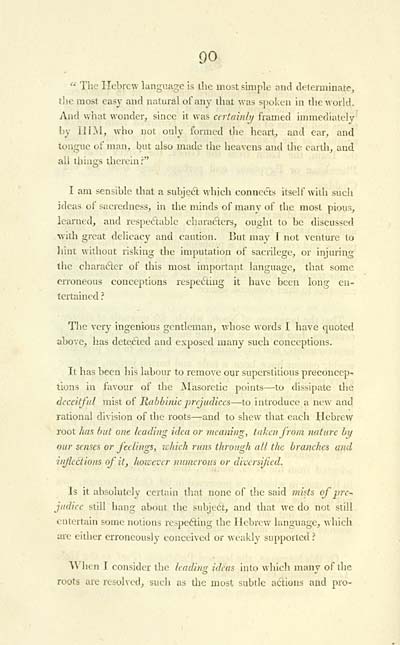Blair Collection > Celtic researches, on the origin, traditions & language, of the ancient Britons
(180)
Download files
Complete book:
Individual page:
Thumbnail gallery: Grid view | List view

90
" The Hebrew language is the most simple and determinate,
tlie most easy and natural of any that was spoken in the world.
And what wonder, since it was certainly framed immediately
by HDl, who not only formed the heart, and ear, and
tongue of man, but also made the heavens and the earthy and
all things therein:"
I am sensible that a subject vvhich connects itself with such
ideas of sacredness, in the minds of many of the most pious,
learned, and respeétable characters, ought to be discussed
with great delicacy and caution. But may I not venture to
liiut without risking the imputation of sacrilege, or injuring
the charatìer of this most important language, that some
erroneous conceptions respecting it have been long en-
tertained .^
The very Ingenious gentleman, whose words I have quoted
above, lias deteéted and exposed many such conceptions.
It has been his labour to remove our superstitious preconcep-
tions in favour of the INIasoretic points — to dissipate the
deceitful mist of Rabbinic prejudices — to introduce a new and
rational division of the roots — and to shew that each Hebrew
root has but one leading idea or meaning, taken from nature by
our senses or feelings, zchich runs through all the branches and
infections of it, hozcevcr numerous or diversified.
Is it absolutely certain that none of the said mists of pre-
judice still hang about the subjeét, and that we do not still
entertain some notions respeéling the Ilebrcv/ language, which
are either erroneously conceived or weakly supported?
Wlicn I consider the leading ideas into which many of the
roots are resolved, such as the most subtle adions and pro-
" The Hebrew language is the most simple and determinate,
tlie most easy and natural of any that was spoken in the world.
And what wonder, since it was certainly framed immediately
by HDl, who not only formed the heart, and ear, and
tongue of man, but also made the heavens and the earthy and
all things therein:"
I am sensible that a subject vvhich connects itself with such
ideas of sacredness, in the minds of many of the most pious,
learned, and respeétable characters, ought to be discussed
with great delicacy and caution. But may I not venture to
liiut without risking the imputation of sacrilege, or injuring
the charatìer of this most important language, that some
erroneous conceptions respecting it have been long en-
tertained .^
The very Ingenious gentleman, whose words I have quoted
above, lias deteéted and exposed many such conceptions.
It has been his labour to remove our superstitious preconcep-
tions in favour of the INIasoretic points — to dissipate the
deceitful mist of Rabbinic prejudices — to introduce a new and
rational division of the roots — and to shew that each Hebrew
root has but one leading idea or meaning, taken from nature by
our senses or feelings, zchich runs through all the branches and
infections of it, hozcevcr numerous or diversified.
Is it absolutely certain that none of the said mists of pre-
judice still hang about the subjeét, and that we do not still
entertain some notions respeéling the Ilebrcv/ language, which
are either erroneously conceived or weakly supported?
Wlicn I consider the leading ideas into which many of the
roots are resolved, such as the most subtle adions and pro-
Set display mode to: Large image | Transcription
Images and transcriptions on this page, including medium image downloads, may be used under the Creative Commons Attribution 4.0 International Licence unless otherwise stated. ![]()
| Early Gaelic Book Collections > Blair Collection > Celtic researches, on the origin, traditions & language, of the ancient Britons > (180) |
|---|
| Permanent URL | https://digital.nls.uk/75765861 |
|---|
| Description | A selection of books from a collection of more than 500 titles, mostly on religious and literary topics. Also includes some material dealing with other Celtic languages and societies. Collection created towards the end of the 19th century by Lady Evelyn Stewart Murray. |
|---|
| Description | Selected items from five 'Special and Named Printed Collections'. Includes books in Gaelic and other Celtic languages, works about the Gaels, their languages, literature, culture and history. |
|---|

